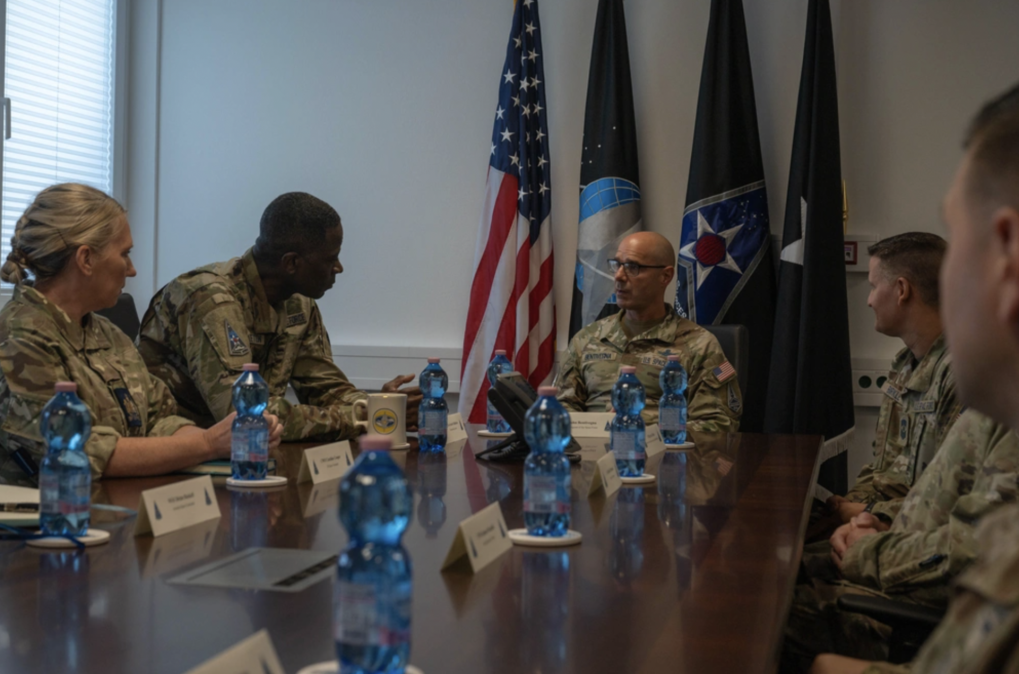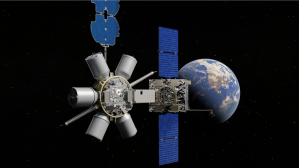Space Force leaders in Europe, Africa move to enhance allies’ access to commercial tech

NATIONAL HARBOR, Md. — Since the start of his tenure as the top U.S. Space Force general in Europe and Africa last year, Brig. Gen. Jacob Middleton has been strategically working to expand the access that military allies and partners across those regions have to space capabilities offered by the private sector.
“A lot of what we’re doing is training and educating them on how to leverage commercial — so they don’t have to come to us,” SPACEFOREUR-AF Commanding General Middleton told DefenseScoop this week.
At a media roundtable during the AFA’s Air, Space and Cyber conference, he briefed reporters on some of the command’s current pursuits abroad, including near-term plans to support regional partners in new ways by connecting them to commercially-made warfighting and intelligence assets.
“What I hope to do, specific to [U.S. European Command and Africa Command] is create a situation during peacetime that — through partnerships, and allies, and working together — teamwork provides a deterrence that, for those that are competing against us, hopefully that acts as a deterrent that they won’t do something that may possibly lead to conflict,” Middleton said. “More specifically, what my view of space is, I think space helps us have a common understanding of what reality is, because it is global, and so you can have a picture that’s shareable — which is why I’m a big fan of commercial [solutions] doing as much as they can in space. So, I’m a believer in that. The government should only be doing what only the government can do.”
Activated in late 2023 and headquartered at Ramstein Air Base, Germany, U.S. Space Forces Europe – Space Forces Africa is a U.S. Space Force field command supporting Eucom and Africom through training, personnel, equipment and other means.
“The current split by the Unified Command Plan, the one we’re currently following, is 100 kilometers and above is a Space Command, and below that is service components, and that’s how we kind of delineate the two,” Middleton said. “So I am focused on what we call ‘the operational level down to the tactical level’ when it comes to space.”
SPACEFOREUR-AF officials “leverage commercial heavily” to meet their missions, he noted. Some of those include helping regional partners confront natural disasters, illegal fishing and other contemporary threats.
“The important piece of that is, what we do is we go out and we leverage commercial and so we have a process where we go through and say, ‘Hey, such and such country needs this’ — but they can make that request directly. Typically, it comes to the embassy, depending on the relationship that’s been formally established. We go out and do that, and we move it back. What we’re moving to is the ability for them to do that themselves,” Middleton told DefenseScoop.
“And so we’re in the early stages of that. [Africom Commander Gen. Dagvin Anderson] would like to do a commercial space symposium in Africa. We’re going to do something similar in Eucom to get after [this], because the stuff that they need from us — that’s only unique to us and only we can provide — is not as great as what commercial can actually provide,” the commander said.
Middleton is leading the field command at a time when Russia’s war in Ukraine wages on and tensions across Europe continue to intensify. During the recent 2025 NATO Summit in The Hague, the alliance pledged to invest 5% GDP annually on defense- and security-related spending by 2035.
Russia has also intruded on the airspace of multiple NATO nations in recent weeks.
“As far as the incursions — that’s above my pay grade on how [the response to] that’s going to be decided. But I believe in open source. NATO has released some things on how they’re assessing that,” Middleton told reporters.
In terms of lessons learned from the war to date, he pointed to “the ability to innovate and move at a speed of relevance in Ukraine,” noting that “the challenge for us is trying to figure out how to replicate that.”






